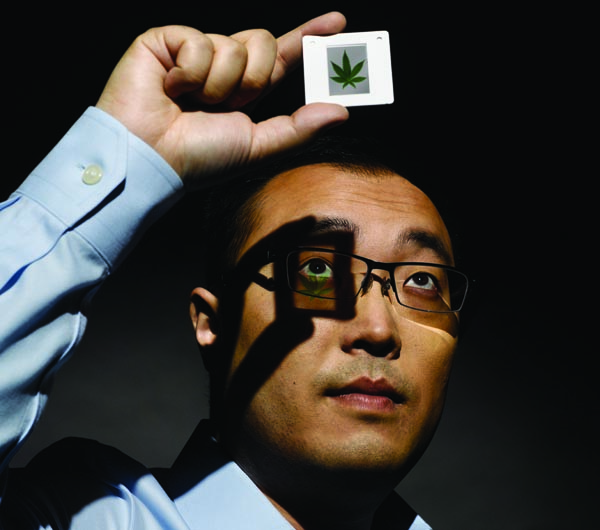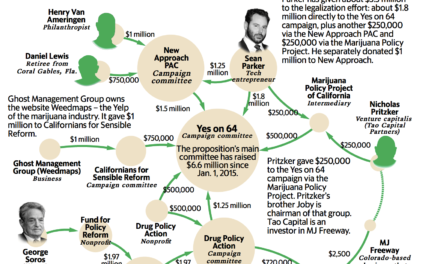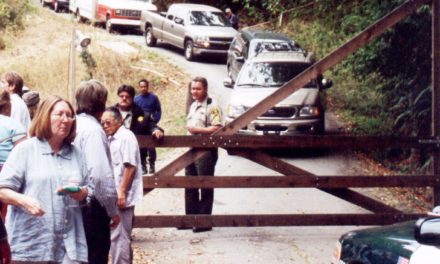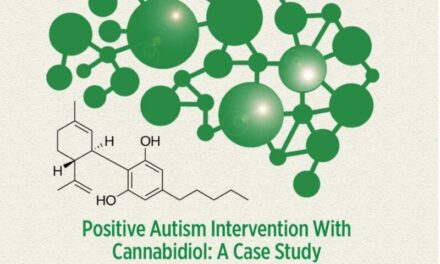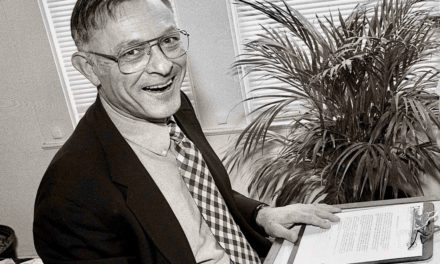On the cover of the current issue of Breakthroughs, the UC Berkeley College of Natural Resources alumni magazine, is a staged photo of a young scientist holding up a slide with an image of a marijuana leaf, as if seriously studying it. The light reflects the image of the leaf onto his eyeglasses.
The scientist is Daniel Nomura, an assistant professor described as “a chemical physiologist” in Mark MacNamara’s informative profile. Nomura is actually studying the steps by which the enzyme that breaks down the endocannabinoid 2-AG is produced.
Nomura had identified that enzyme —monoglycerol lipase, abbreviated MAGL, pronounced Mag-L— while working in Benjamin Cravatt’s lab at Scripps Research Institute in La Jolla. He had been systematically studying enzymes inhibited by certain pesticides. (Agricultural insecticides don’t just eliminate the enzyme that’s essential for the pest’s reproduction; they prevent the synthesis of other enzymes, too. One animal’s collateral damage is another’s research opportunity.)
At Cravatt’s lab Nomura was in on the discovery that inhibiting MAGL production led to enhanced cannabinoid-receptor activation and that MAGL inhibition reduces cancer cell growth. He has subsequently shown that MAGL inhibition reduces brain inflammation. His practical goal is a drug that confers the benefits of cannabis (without the “high”) and aspirin (without irritation of the stomach lining).
Nomura and Cravatt were the principal authors of a paper published in Science on 11/11/11, “Endocannabinoid Hydrolysis Generates Brain Prostaglandins That Promote Neuroinflammation.” Pfizer’s head of neuroinflammation research called the finding that MAGL links the endocannabinoid and prostaglandin signaling networks “a very important breakthrough.”
Here’s MacNamara’s summary: “Nomura also found that when MAGL breaks down endocannabinoids, that process generates a fatty acid that is, in turn, converted into molecules called prostaglandins. Prostaglandins signal the body to start the inflammation process. Nomura found that blocking MAGL reduces these prostaglandins, but only in the brain — not in the gut.
“Anyone who’s popped an aspirin or ibuprofen has manipulated prostaglandins in their brain. These non-steroidal anti-inflammatory drugs lower prostaglandin production, thereby lowering fever, pain, and inflammation. But they can act on the stomach lining, leading to ulcers.
“Thus, Nomura showed that with a little help — the blocking of MAGL with inhibitors — the body itself can provide the benefits of both marijuana and aspirin, without their side effects.
“So the hypothesis for Nomura then became, if we can stop neuroinflammation by blocking MAGL, can this help alleviate neurodegeneration?
“A series of experiments to test this theory yielded promising results. For example, Nomura found that in a mouse model of Parkinson’s disease, when MAGL was blocked, the mice were protected against neurodegeneration and dopamine loss. He is now following up on these discoveries, testing whether blocking MAGL can protect against other neurodegenerative diseases, like Alzheimer’s or multiple sclerosis.”
Breakthroughs’ hokey but eye-catching cover photo of Nomura studying the marijuana leaf is by Paul Kirchner Studios.

